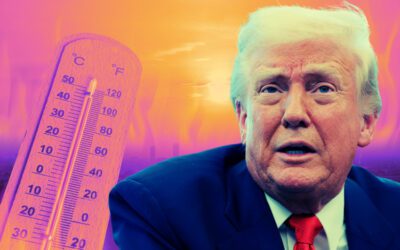
AP Photo/Ben Curtis
DETROIT—President Donald Trump’s short reprieve for US automakers from stiff tariffs on imports from Mexico and Canada isn’t likely to allow enough time for those companies to make the changes necessary to minimize the damage from Trump’s intensifying trade war.
Trump granted a one-month exemption to 25% tariffs on vehicles and auto parts traded through the North American trade agreement USMCA after speaking with leaders of automakers Ford, General Motors and Stellantis, the White House said Wednesday. Trump then broadened the exemption beyond autos for Mexico and some imports from Canada on Thursday.
In response to concerns about the short timeline for auto companies, White House Press Secretary Karoline Leavitt noted that Trump told the companies to “start investing, start moving, shift production here.”
It’s just not that simple.
Automakers “will be hit differently based on exactly where their supply chain is,” said John Paul MacDuffie, professor of management at the University of Pennsylvania. In particular, “GM and Ford have shrunk back from a formerly much more global footprint, but they still are global companies.
“Of course, if the goal is to move a lot of production to the US,” he added, “I guess you could. But I don’t see those changes happening quickly.”
Automakers responded to Wednesday’s news graciously. Ford said in a company statement: “We will continue to have a healthy and candid dialogue with the Administration to help achieve a bright future for our industry and US manufacturing.” Both GM and Stellantis thanked Trump for the exemption in statements.
Matt Blunt, president of the American Automotive Policy Council, which represents the three automakers, said he applauds the president “for recognizing that vehicles and parts that meet the high US and regional USMCA content requirements should be exempt from these tariffs.”
But with only a monthlong grace period, automakers know challenges lie ahead.
Why is this so hard for auto companies?
To be sure, as automakers spent decades expanding around the world, they frequently battled supply-related woes and policy changes that hindered production—and their bottom lines.
A disaster halfway across the globe impacting one tiny component, with no easy or obvious supply alternative, can take down a vehicle’s production for weeks.
Contentious labor negotiations and work stoppages have put significant pauses on automaking for the domestic car companies.
The COVID-19 pandemic also interrupted global supply chains and sent new and used vehicle inventory to disastrous lows on dealer lots, causing prices to skyrocket.
“At least automakers have seen some version of this uncertainty,” said Hovig Tchalian, assistant professor at the University of Southern California. “I think this uncertainty is actually higher. But they’ve had some practice doing it.”
Working in the favor of automakers are normalized and in some cases high levels of inventory at dealerships; a healthy number of cars yet to be sold provides a buffer to any slowdown in production.
But for years automakers and suppliers have kept a strategic amount of parts on hand—enough to account for disruptions but not so much that excess capital is tied up in components just sitting in warehouses.
“What the 30 days will allow them to do is to analyze what kind of work in progress they’ve got, what kind of parts stock that they’ve got,” Martin French, partner at consultancy Berylls by AlixPartners, said of automakers and their supply companies.
Generally there has been a lot of progress in US manufacturing, he said, “But the reality is that just does not happen in the space of a couple of weeks.”
Compounding impact
Those disruptions and others throughout the business’s history have made it clear that automakers can only respond so quickly.
The tariff exemption is no exception, given the ever-increasing complexity of assembly lines and manufacturing. Plants can’t be moved, factories can’t be built and product lines can’t be changed overnight.
And even with this pause, steel and aluminum tariffs are still expected to go into effect on March 12. Then, on April 2, Trump is expected to set broad “reciprocal” tariffs to match the taxes and subsidies charged by other countries on imports.
Those would disrupt the automotive industry quickly and dramatically, said Sam Fiorani, an analyst at AutoForecast Solutions.
“A substantial change in automotive free trade will hurt stock prices of all automakers because their profits will take a hit and consumers will face higher prices on vehicles, further diluting sales going forward,” he said.
Not only do companies have to decide whether immediate changes in production are realistic, but if they’re unable to do that meaningfully, they might produce or sell fewer vehicles—sending new car buyers to other brands or the used market—and, ultimately, make less money.
“The uncertainty that’s being created for the auto industry is going to inhibit investment as firms try to assess what the future looks like,” said Brett House, a professor at Columbia University’s business school, “and they have very little clarity on it.”
READ MORE: Veterans fired from federal jobs say they feel betrayed, including some who voted for Trump

7 facts about the new Pope’s time in Michigan
Once known as "Father Bob," Pope Leo XIV's path to the priesthood began right here in Michigan! For several days this May, the world waited in...

Trump administration under fire for weakening PFAS standards
BY KYLE DAVIDSON, MICHIGAN ADVANCE MICHIGAN—Following an announcement from the Environmental Protection Agency bringing an end to regulations on...

Trump, with Whitmer at his side, announces new fighter wing for Michigan’s Selfridge air base
BY JON KING, MICHIGAN ADVANCE MICHIGAN—Gov. Gretchen Whitmer joined President Donald Trump when he landed at Selfridge Air National Guard Base in...

Detroit Democrats are once again looking to unseat one of their own in Congress
MICHIGAN—Detroit Democrats are once again trying to restore Black representation to the city by unseating an incumbent, as the party more broadly...

Trump will hold a rally in Michigan next week to mark his first 100 days in office
LANSING—President Donald Trump will mark his first 100 days in office next week with a rally in Michigan, his first since returning to the White...







